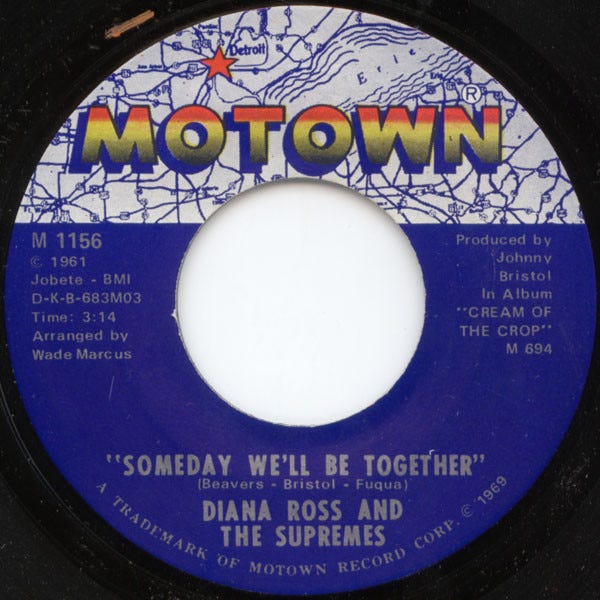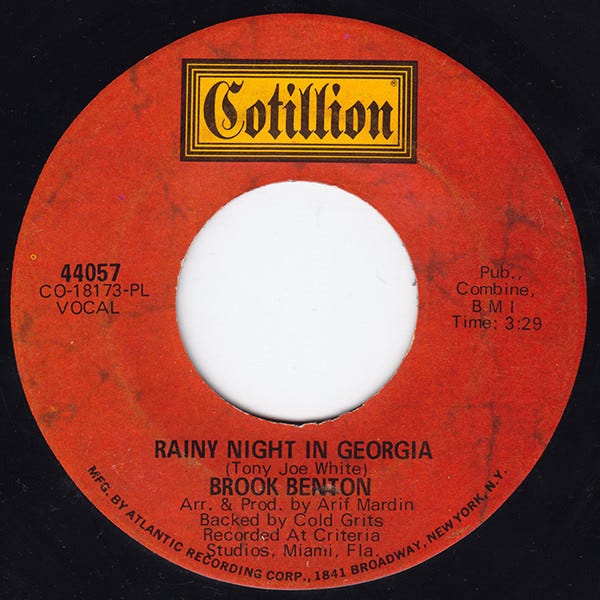

20 years ago — 20 years ago! 2004! Y’know, the last time there was a horrific rightward turn in the American political mood, remember that? — I started a new blog devoted to reviewing each of the R&B #1 singles of the 1970s. I’d done it for the ‘80s (which I may take a freshened look at one of these days), so thought I’d try the same for a decade with which I was much less familiar. I didn’t get further than halfway through 1970, but why not return to it? Now that I’m trying to internalize lessons from other writers I love about how writing doesn’t have to be perfect, it just has to be, and to write first/research later (hi!), my hope is that I can start spitting these out on a regular basis. Plus I’m actually getting more disciplined about writing, which is a big deal for me. So let’s start by looking at some entries I actually wrote 20 years ago, and seeing where we go from here. Yes, there’ll be a playlist linked at the bottom of each post, of course, and yes, anything not streaming will get embedded videos, because that’s how I roll. I’ll try not to post too many at once, so it doesn’t get overwhelming.
One other thing: I know that nowadays Drake has had 8,000 chart entries and the Weekend spent 79 weeks at #1 (slight exaggerations), but I’m using chart data from the Joel Whitburn book ending in 2008, because not long after that point Billboard’s R&B chart became relatively pointless.
"Someday We'll Be Together," Diana Ross and the Supremes (12/13/69)
As the '60s drew to a close and the '70s began, it was certainly fitting that the sound of black America, Motown Records — whatever Berry Gordy may have wanted us to believe, that's what Motown was, as well as the sound of young America — and its queen Miss Ross were atop the then-named Hot Soul Singles chart with the Supremes’ final single in their original form. Though really they're together in name only, as this is effectively the start of Ross’s solo career (cf. “Careless Whisper,” released everywhere but the U.S. as “Wham! featuring George Michael”). And while it's still got sparks of that Motown magic, it's also overly florid, presaging Diana's career as a blow-out-the-lights big-voiced balladeer to come. It’s good, yes, but not as good as you may think. B-
"I Want You Back," The Jackson 5 (1/10/70)
This, however, is likely better than you think. The brothers Jackson's first single commenced a phenomenal year for them, with their first four singles all hitting #1; they spent 20 weeks atop the R&B chart in 1970. "Back" has got the Motown sound to it, but is so much more, nearly overloaded with joie de vivre and the ebullience that just pours from both kids and those who know it might be their only shot. If "I Want You Back" can't make you smile, well, I can’t help you. I mean, come on: that killer piano riff, the greasy chicken-scratch guitar, little Michael's let-the-sunshine-through leads, and the superb backing of his brothers all add up to not just a J5 classic, but a classic single, let alone debut, period. A-
"Thank You (Falettinme Be Mice Elf Agin)," Sly & the Family Stone (2/7/70)
Sly and his family are true sacred cows, but I’m sorry, JB did the funk better and Hendrix did the black psychedelia better. "But Sly combined the two!," you respond. True, but both were a bit watered-down as a result. “Thank You” is the essence of middling to me, by no means as great as its lore, and the epitome of overrated. C+
"Rainy Night In Georgia," Brook Benton (3/14/70)
Benton was a smooth-voiced singer who hit the top of the R&B chart with a hat trick of singles in ’59, a further trio in ’60, and then didn’t have another #1 until this breathtakingly gorgeous record in 1970. Only 39 at the time of "Rainy Night," his voice sounded much more weathered and here’s the key, worldly than one might expect. Not only was Benton in extreme control of his gift, he imbued the lyrics he sang with an authority; the man had presence beyond repair. To my ears, Ray Charles’ version of this comes off as slightly "Georgia Tourism Board" hammy, whereas Benton gets the song’s true intent and feel. A class act, and a bravura performance. A
"Call Me," Aretha Franklin (3/21/70)
Before I get to the single itself, let me break down a few things about the Queen of Soul and her R&B chart stats for you. On the pop charts, she’s had 2 #1s. On the R&B charts, she’s tied for #1 with 20 (tied with Stevie, that is). Those 20 charttoppers spent among them 65 weeks at #1. Aretha was the #5 R&B artist of the '60s, the #2 of the ‘70s, and the #8 of the ‘80s. Respect, indeed. "Call Me" was Re’s 8th #1 overall, and her first of the ‘70s, from the midst of her most astounding period, when she was cranking out classic after classic with the Muscle Shoals crew for Atlantic. And it’s just — oh! The strings are subtle, the piano is subtle, the friggin’ backing singers are subtle, in that none of them ever overshadow that voice. Damned right Jerry Wexler knew what he was doing — she’s never overshadowed, always accented to perfection by the various elements of "Call Me." Aretha, of course, pours herself relentlessly into the lyrics, begging her man, with whom she understands things have to end, to "call [her] the moment [he] get[s] there," intoning to him "I love you, and I love you" forever and ever, amen. In this case, masterpiece is an understatement. A+


